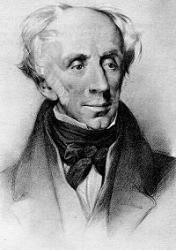Planning worship?
Check out our sister site, ZeteoSearch.org,
for 20+ additional resources related to your search.
- |
User Links
Person Results
Felix Mendelssohn-Bartholdy

1809 - 1847 Person Name: F. Mendelssohn-Bartholdy Harmonizer of "BRESLAU" in Songs of Praise Felix Mendelssohn-Bartholdy (b. Hamburg, Germany, 1809; d. Leipzig, Germany, 1847) was the son of banker Abraham Mendelssohn and the grandson of philosopher Moses Mendelssohn. His Jewish family became Christian and took the Bartholdy name (name of the estate of Mendelssohn's uncle) when baptized into the Lutheran church. The children all received an excellent musical education. Mendelssohn had his first public performance at the age of nine and by the age of sixteen had written several symphonies. Profoundly influenced by J. S. Bach's music, he conducted a performance of the St. Matthew Passion in 1829 (at age 20!) – the first performance since Bach's death, thus reintroducing Bach to the world. Mendelssohn organized the Domchor in Berlin and founded the Leipzig Conservatory of Music in 1843. Traveling widely, he not only became familiar with various styles of music but also became well known himself in countries other than Germany, especially in England. He left a rich treasury of music: organ and piano works, overtures and incidental music, oratorios (including St. Paul or Elijah and choral works, and symphonies. He harmonized a number of hymn tunes himself, but hymnbook editors also arranged some of his other tunes into hymn tunes.
Bert Polman
Felix Mendelssohn-Bartholdy
Samuel Sebastian Wesley

1810 - 1876 Person Name: Samuel Sebastian Wesley, 1810 - 76 Composer of "WINSCOTT" in Service Book and Hymnal of the Lutheran Church in America Samuel Sebastian Wesley (b. London, England, 1810; d. Gloucester, England, 1876) was an English organist and composer. The grandson of Charles Wesley, he was born in London, and sang in the choir of the Chapel Royal as a boy. He learned composition and organ from his father, Samuel, completed a doctorate in music at Oxford, and composed for piano, organ, and choir. He was organist at Hereford Cathedral (1832-1835), Exeter Cathedral (1835-1842), Leeds Parish Church (1842-1849), Winchester Cathedral (1849-1865), and Gloucester Cathedral (1865-1876). Wesley strove to improve the standards of church music and the status of church musicians; his observations and plans for reform were published as A Few Words on Cathedral Music and the Music System of the Church (1849). He was the musical editor of Charles Kemble's A Selection of Psalms and Hymns (1864) and of the Wellburn Appendix of Original Hymns and Tunes (1875) but is best known as the compiler of The European Psalmist (1872), in which some 130 of the 733 hymn tunes were written by him.
Bert Polman
Samuel Sebastian Wesley
William Wordsworth

1770 - 1850 Author of "Blest are the moments, doubly blest" in The Hymnal Wordsworth, William, the poet, the son of an attorney, was born at Cockermouth in 1770, and educated at St. John's College, Cambridge, where he graduated B.A. in 1791. Devoting himself to literature, and especially to poetry, he gradually rose into the front rank of English poets. His works include Lyrical Ballads, 1798; Poems; The Prelude; The Excursion, 1814, &c. All his poetical productions were collected and republished under his own supervision in 7 vols., in 1842. He died at Kydal Mount, near Grasmere, in 1850. Notwithstanding his rank and reputation as a poet, his pieces used as hymns are limited to the following extracts from his poems:—
1. Not seldom clad in radiant vest. Christ, the Unchangeable. This is No. v. of five "Inscriptions supposed to be found In and near a Hermit's cell, 1818." It is in 5 stanzas of 4 lines, and is given in his Poetical Works, 1831, vol. iii., p. 290. It is in Stowell's Selection of Hymns, 1831-77; the American Plymouth Collection, 1855, &c.
2. Up to the throne of God is borne. Noonday. This is entitled "The Labourer's Noon-Day Hymn," is dated 1834, and is in 6 stanzas of 4 lines. (Poetical Work, 1837, vol. v. p. 122.) It is in common use in an abridged form, beginning with stanza i., and the latter part is also given in Martineau's Hymns, 1840, as "Look up to heaven, the industrious sun," as No. 535.
-- John Julian, Dictionary of Hymnology (1907)
William Wordsworth
William Knapp

1698 - 1768 Composer of "WAREHAM" in The Hymnal Born: 1698, Wareham, Dorsetshire, England.
Died: September 26, 1768, Poole, Dorsetshire, England.
Buried: Poole, Dorsetshire, England.
William Knapp
Ivar Widéen
1871 - 1951 Person Name: Karl Ivar Natanael Wideen, 1871 - 1951 Composer of "SKARA" in Service Book and Hymnal of the Lutheran Church in America Widéen Karl Ivar Natanael; 1871-1951; composer, church musician)
Ivar Widéen


 My Starred Hymns
My Starred Hymns


